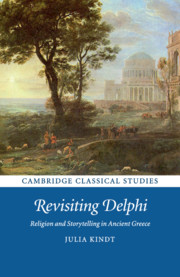Book contents
- Frontmatter
- Dedication
- Contents
- List of Illustration
- Acknowledgements
- List of Abbreviations
- 1 Introduction: Revisiting Delphi
- 2 Herodotus: Delphi, Oracles and Storytelling in the Histories
- 3 Euripides: Ironic Readings of Apollo and his Prophecies
- 4 Plato: Socrates, or Invoking the Oracle as a Witness
- 5 Pausanias: What's the Stuff of Divinity?
- 6 Athenaeus: Encountering the Divine in Word and Wood
- 7 Conclusion: Religion and Storytelling in Ancient Greece
- Appendix: Plutarch – A Philosophical Enquiry into an Enigmatic Divine Sign
- Bibliography
- Index
6 - Athenaeus: Encountering the Divine in Word and Wood
Published online by Cambridge University Press: 05 September 2016
- Frontmatter
- Dedication
- Contents
- List of Illustration
- Acknowledgements
- List of Abbreviations
- 1 Introduction: Revisiting Delphi
- 2 Herodotus: Delphi, Oracles and Storytelling in the Histories
- 3 Euripides: Ironic Readings of Apollo and his Prophecies
- 4 Plato: Socrates, or Invoking the Oracle as a Witness
- 5 Pausanias: What's the Stuff of Divinity?
- 6 Athenaeus: Encountering the Divine in Word and Wood
- 7 Conclusion: Religion and Storytelling in Ancient Greece
- Appendix: Plutarch – A Philosophical Enquiry into an Enigmatic Divine Sign
- Bibliography
- Index
Summary
Introduction
This chapter starts from a somewhat eccentric source: an excerpt from Semus’ lost History of Delos, dating perhaps from the late third century BCE. It is preserved in Athenaeus’ Deipnosophistae, a loosely conceived collection of learned tales and fragments of earlier authors dating from the third century CE. It tells a rather odd story of laughter – lost, then regained – which may leave the modern reader slightly puzzled (not just left out on the joke). After all, the story features the rather disturbing image of a human protagonist laughing about a divine representation and – as so often in Delphic oracle stories – what is at stake in the peculiar string of events is by no means immediately obvious.
By relating the series of incidents featured in the story to the ‘surrounding world of significance’, and by drawing various lines between the text and its cultural, historical and, indeed, cognitive context, the joke at the core of this story will become clear. More importantly, perhaps, Greek ways of thinking about the gods become intelligible, a ‘theology’ of ancient Greek religion that we already encountered in a different form in the previous chapter. So, let us start at the beginning: with the story itself.
Parmeniscus’ Journey
Παρμενίσκος δὲ ὁ Μεταποντῖνος, ὥς φησιν Σῆμος ἐν ε´ Δηλιάδος, καὶ γένει καὶ πλούτῳ πρωτεύων εἰς Τροφωνίου καταβὰς καὶ ἀνελθὼν οὐκ ἔτι γελᾶν ἐδύνατο. καὶ χρηστηριαζομένῳ περὶ τούτου ἡ Πυθία ἔφη·
εἴρῃ μ’ ἀμφὶ γέλωτος, ἀμείλιχε, μειλιχίοιο·
δώσει σοι μήτηρ οἴκοι· τὴν ἔξοχα τῖε.
ἐλπίζων δ’ ἂν ἐπανέλθῃ εἰς τὴν πατρίδα γελάσειν, ὡς οὐδὲν ἦν πλέον, οἰόμενος ἐξηπατῆσθαι ἔρχεταί ποτε κατὰ τύχην εἰς Δῆλον· καὶ πάντα τὰ κατὰ τὴν νῆσον θαυμάζων ἦλθεν καὶ εἰς τὸ Λητῷον, νομίζων τῆς Ἀπόλλωνος μητρὸς ἄγαλμά τι θεωρήσειν ἀξιόλογον· ἰδὼν δ’ αὐτὸ ξύλον ὂν ἄμορφον παραδόξως ἐγέλασεν. καὶ τὸν τοῦ θεοῦ χρησμὸν συμβάλλων καὶ τῆς ἀρρωστίας ἀπαλλαγεὶς μεγαλωστὶ τὴν θεὸν ἐτίμησεν.
But Parmeniscus of Metapontum, as Semus states in book 5 of his History of Delos, a distinguished man by birth and wealth, was unable to laugh after he had descended into and returned from the oracle of Trophonius.
- Type
- Chapter
- Information
- Revisiting DelphiReligion and Storytelling in Ancient Greece, pp. 131 - 152Publisher: Cambridge University PressPrint publication year: 2016



